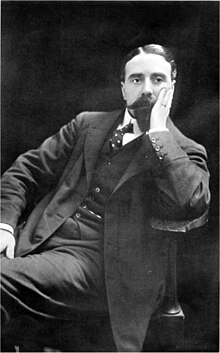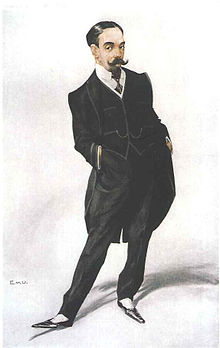Thomas Beecham
Sir Thomas Beecham, 2nd Baronet CH FRCM (born April 29, 1879 in St Helens , Lancashire , † March 8, 1961 in London ) was a British conductor who founded several British symphony orchestras. These foundings include the New Symphony Orchestra (1906), the London Philharmonic Orchestra (1932) and the Royal Philharmonic Orchestra (1947).
Beecham was also a patron of numerous composers of his time. He was instrumental in the performance of works by Frederick Delius , Ethel Smyth and Jean Sibelius . He was the first in England to play The Mastersingers of Nuremberg by Richard Wagner and the operas Elektra and Salome by Richard Strauss and made a significant contribution to the enrichment of the musical life of the British capital.
Life
Thomas Beecham was brought up as the son of the rich pharmacist Sir Joseph Beecham, 1st Baronet in Oxford, and was self-taught in the musical field. Due to his financial circumstances, he was able to get involved musically on a broad scale. From 1902 to 1904 he directed a small opera ensemble; He was only able to take over the artistic and economic management of Covent Garden thanks to the financial support of his family. Just as economically brave, he founded the Beecham Opera Company during the First World War, which he had to give up as a separate ensemble in 1920 because the expenses far exceeded the income. In 1916 he inherited the title of Baronet , of Ewanville in the County of Lancaster from his father .
Part of his form of conducting was to add small pieces that were particularly effective to the public at the end of a concert. Beecham himself liked to refer to this selection of works as "lollipops" (sweets).
There are numerous anecdotes about Beecham, who had a witty joke, a selection of which were published in book form by his former private secretary ("Beecham Stories"). For example, the following two bonmots are attributed to Beecham:
“There are two golden rules for an orchestra: start together and finish together. The public doesn't give a damn what goes on in between. "
“There are two golden rules for an orchestra: start together and stop together. The audience doesn't care what happens in between. "
"The English may not like music, but they absolutely love the noise it makes."
"The English may not like music, but they absolutely love the noise it makes."
Fonts
- A mingled chime. Leaves from an Autobiography. Hutchinson, London et al. 1944.
- Frederick Delius. Hutchinson, London 1959 (Reprint. Vienna House, New York NY 1973, ISBN 0-8443-0082-9 ).
- John Fletcher (= The Romanes Lecture. 1956, ISSN 0267-9760 ). Clarendon Press, Oxford: Oxford University Press 1956
Literature (selection)
- John Lucas: Thomas Beecham. An obsession with music. Boydell Press, Woodbridge et al. 2011, ISBN 978-1-84383-402-1
- Alan Jefferson : Sir Thomas Beecham. A Centenary Tribute. Macdonald and Jane's, London 1979, ISBN 0-354-04205-X .
- Humphrey Procter-Gregg: Beecham Remembered. Duckworth, London 1976, ISBN 0-7156-1117-8 .
- Charles Reid: Thomas Beecham. An Independent Biography. Victor Gollancz, London 1961.
Web links
- Thomas Beecham in the Internet Movie Database (English)
- Thomas Beecham at Discogs (English)
- Short biography and photos
- Newspaper article about Thomas Beecham in the 20th century press kit of the ZBW - Leibniz Information Center for Economics .
Individual evidence
- ↑ a b cf. brainyquote.com , accessed June 2, 2010.
| predecessor | title | successor |
|---|---|---|
| Joseph Beecham | Baronet, of Ewanville 1916-1961 |
Adrian Beecham |
| personal data | |
|---|---|
| SURNAME | Beecham, Thomas |
| ALTERNATIVE NAMES | Beecham, 2nd Baronet, Thomas (full name) |
| BRIEF DESCRIPTION | British conductor, founder of several symphony orchestras |
| DATE OF BIRTH | April 29, 1879 |
| PLACE OF BIRTH | St Helens (Merseyside) |
| DATE OF DEATH | March 8, 1961 |
| Place of death | London |


